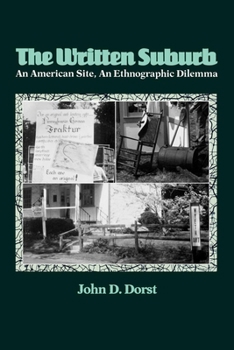The Written Suburb: An American Site, an Ethnographic Dilemma
(Part of the Contemporary Ethnography Series)
Select Format
Select Condition 
Book Overview
The Written Suburb An American Site, An Ethnographic Dilemma John D. Dorst "A wonderful book that . . . is shrewd and often quite funny . . . and] employs the tools of an anthropologist to explain the strange folkways of late 20th-century Pennsylvania suburbanites."--Philadelphia Inquirer "A subversive and postmodern work about the town of Chadds Ford, Pennsylvania. The book considers Wyeth country--what kind of place it is and how it is constituted. . . . Dorst asks questions about how the place represents itself to itself and to tourists."--Lingua Franca "The Written Suburb contains brilliant analysis of the myth of tradition and the workings of museums and historical societies. . . . Dorst's elegant, ironic prose makes his assault on the toxic combination of commerce and nostalgia sharp and satisfying. Folklorists should read, argue with, teach, and visit The Written Suburb again and again."--Journal of American Folklore "The Written Suburb presents a provocative and important methodological paradox for those communications scholars who practice or are interested in ethnography. . . . As a self-conscious post-ethnography, this work is powerful--and often humorous--both in describing the 'very weirdness' of suburban America in general and in demonstrating the problems in producing such a description."--Journal of Communication "The strength of The Written Suburb lies in Dorst's clear and lucid exposition of the cultural logic of postmodernity and in his application of the postmodern research agenda."--American Journal of Sociology Chadds Ford, an upscale suburb in southeastern Pennsylvania, devotes a lot of energy to creating a historical identity. Numerous institutions participate in this task, including museums, a land conservancy dedicated to the preservation of its historical landscape, and the Historical Society, which is responsible for an annual community celebration. Larger institutions related to regional tourism and suburban development generate a steady flow of texts about Chadds Ford in the form of glossy travel magazines, pamphlets, brochures, and gallery displays. John D. Dorst is Professor of American Studies at the University of Wyoming. He is the author of Looking West, also available from the University of Pennsylvania Press. Contemporary Ethnography 1989 232 pages 6 x 9 50 illus. ISBN 978-0-8122-1282-2 Paper $24.95s 16.50 World Rights Anthropology Short copy: "A subversive and postmodern work about the town of Chadds Ford, Pennsylvania. The book considers Wyeth country--what kind of place it is and how it is constituted. . . . Dorst asks questions about how the place represents itself to itself and to tourists."--Lingua Franca
Format:Paperback
Language:English
ISBN:0812212827
ISBN13:9780812212822
Release Date:May 1989
Publisher:University of Pennsylvania Press
Length:232 Pages
Weight:0.77 lbs.
Dimensions:0.6" x 6.1" x 8.8"
Customer Reviews
2 ratings
Great Example of Modern Ethnography
Published by Thriftbooks.com User , 18 years ago
This is a great example of how to do a modern ethnography. Many of the methods texts dealing with ethnographies fail to provide any useful advice on the topic. This book does not offer advice, but rather a very successful model of what to do. So, you could say that it informs by example. Aside from that particular benefit, the book is a great read and source of useful insights into how communities construct an image to maintain their viability.
An Intellectual Workout
Published by Thriftbooks.com User , 25 years ago
Often when people think about folklore, they picture quaint villages populated by storytellers and quilters. John Dorst seeks to dispel those stereotypes with his postmodern analysis of the hidden ideology and power behind the serene façade of a middle-class elite suburb, in this case, Chadds Ford, PA, home of the Wyeth family of artists. In doing so, he pushes folklore studies into an intriguing new direction. The Written Suburb introduces 4 key concepts: 1.) post-ethnography-the reading of institutions, printed materials, and events such as museums, historical societies, arts and crafts festivals, diner menus, and AAA brochures as postmodern texts; 2.) postmodern vernacular-a particular "dialect" of postmodernity characterized by self-reference without the ironic sense of humor as found in MTV and comic books; 3.) auto-ethnography-the self-generated texts of a literate society capable of observing itself. The folklorist's job is to collect and read critically these texts; and 4.) Site-a suburb as an assemblage of texts and ideology. Dorst also questions the rhetoric behind museums (in this case the Brandywine River Museum) and the concept of tradition. The unique combination of the works of postmodernists and semiotics scholars such as Frederic Jameson and Dean MacCannel with American folklore scholarship is truly stimulating.Being so theoretical, The Written Suburb is not an easy book to read, nor can its concepts be easily grasped in one reading. But it is a valuable book for folklorists who are serious about the evolution of the discipline and who enjoy finding connections between folkloristics and postmodernism.





